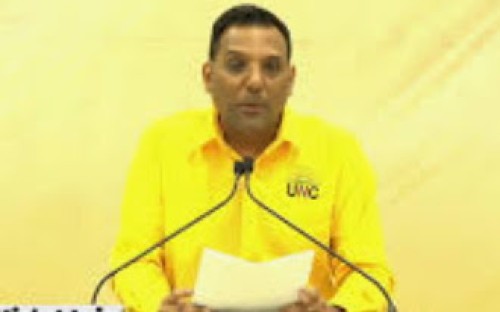PORT OF SPAIN, Trinidad – The ruling United National Congress (UNC) Monday brushed aside concerns raised by the Law Association of Trinidad and Tobago (LATT) which had expressed “deep concern” at “ what appear to be unwarranted attacks on the independence and integrity” of the independent bench of the Parliament.
 UNC public relations officer Dr. Kirk Meighoo (file photo)It said that “those attacks were directed at members of the independent bench who did not support” the legislation to amend provisions governing qualification for a prime minister’s pension.
UNC public relations officer Dr. Kirk Meighoo (file photo)It said that “those attacks were directed at members of the independent bench who did not support” the legislation to amend provisions governing qualification for a prime minister’s pension.
But in a statement, the UNC said it had taken note of the “curious press release” by the LATT saying that it “is unsure as to why the Law Association has inserted itself in this Parliamentary matter”.
The party said it wanted to know if LATT through its statement was “defending” one of its members and whether it believes that the legislator in question represents the association in the Senate.
“Or is this a general intervention? Is this a statement of the Law Association executive on behalf of the general membership? One is unsure. In addition to this, in its release the Law Association makes important errors of fact.”
The UNC said that in its release the LATT “emphasizes the term “independent” to describe and characterize the President’s Senators. The Association should be aware that the Constitution does not describe these Senators as “independent”.
“Furthermore, these Senators have been appointed by the most politically-aligned President in the history of our Republic. Citizens have a right to be skeptical of their actual independence, keep an eye out, and raise questions,” the UNC said.
Late last month, the Senate approved legislation which now sets a minimum one-year term in office for any prime minister to qualify for a state pension as well as a tiered payment structure based on time served.
The legislation has “retroactive” effect from March 10, this year.
The government of Prime Minister Kamla Persad Bissessar had earlier achieved the required special majority in the House of Assembly to pass the Prime Minister’s Pension (Amendment) Bill, 2025, that the opposition People’s National Movement (PNM) legislators said was aimed at former prime minister, Stuart Young, who became head of government on March 17 and lost the April 28 general election.
The bill had required a three-fifths majority to pass in both Houses of Parliament, and prior to its passage in the Senate, President of the legislative chamber, Wade Mark, warned against intimidating legislators whether inside or outside of Parliament, would constitute a breach of privilege, and would not be tolerated.
While Mark, a senior member of the UNC, did not single out any one in particular, the ruling came less than 24 hours after the UNC public relations officer Dr Kirk Meighoo told a news conference that the government would need the support of four independent legislators to have the bill passed.
Meighoo told reporters that were no truly independent senators in the Upper House, as they were all appointed by President Christine Kangaloo, who he said is “a long-standing and deeply embedded figure within the PNM.
In its statement, the UNC said that the LATT “is also mistaken when it claims that “Members of the independent (sic) bench in the Senate are selected by the President to represent various interest groups,” saying “this is an even more serious misrepresentation and misunderstanding.
“It is clear from Section 40(2)(c) quoted above that these Senators are not representatives of interest groups. Why would the Law Association say otherwise?
The UNC said that the LATT appears to be confusing our Republican Constitution with the colonial-era 1961 Constitution, Section 15(1)(c), in which it instructs that
“seven [Senators] shall be appointed, to represent religious, economic or social interests in the Territory, by the Governor, acting after consultation with such persons as, in his discretion, he considers can speak for those interests and ought to be consulted.”
It said that this function was removed the following year in 1962 at Independence, and then more decisively in 1976 with the Republican Constitution.
“The Law Association’s curiously outdated colonial-era confusion mirrors their outdated colonial-type opinions on the relation of citizens to Parliamentarians.”
The ruling party said that it remains concerned “about entrenched members of the establishment — including the Law Association and sections of the media — characterizing analysis and criticism of the President’s Senators as “unwarranted attacks on … [their] independence and integrity”.
“It is deeply undemocratic to attempt to stifle legitimate and lawful criticism of lawmakers.
All Parliamentarians — including the President’s appointed Senators — are duly subject to analysis and criticism. They are public servants, paid by taxpayers, conducting public business.”
The party said that it notes the LATT has been “silent” on the threat of an independent legislator to threaten criminal action against the party’s public relations officer “in order to silence or punish him.
“Criticizing the President’s Senators is not a crime, and this threat was meant to intimidate,” it said, adding “The Law Association should be careful to not attempt to stifle democratic criticism, misrepresent the constitution, and portray a thinly-veiled defense of the reputation of one of its publicly disgraced members as “deep concern” about “parliamentary law-making”.


